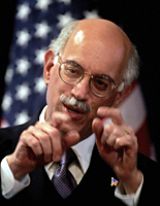US envoy’s warnings on Darfur went unheeded in 2003
Sept 21, 2006 (WASHINGTON) — Darfur, the troubled western Sudan region, was barely a speck on the international horizon in October 2003 when Andrew Natsios, head of the U.S. foreign aid agency, traveled there to learn more about the area’s developing humanitarian crisis.
 He tried in vain to call attention to the situation in the remote region.
He tried in vain to call attention to the situation in the remote region.
Within six months, however, the word about Darfur had spread: It was, according to the United Nations, the world’s worst humanitarian crisis.
Natsios will be returning to Sudan again shortly, this time as President George W. Bush’s special envoy to that country. Bush saw fit to create the post because the crisis in Darfur persists and may even get worse. Hundreds of thousands of Darfurians have died since 2003, and more than 2 million have been uprooted from their homes.
Natsios’ mandate will be to persuade the Sudanese government to accept 20,000 U.N. peacekeepers and police to help stabilize the situation in Darfur, which President Omar al-Bashir’s government in Khartoum has refused to do. An underfunded African Union force of 7,000 currently is on duty in Darfur.
Natsios said international pressure on the Sudanese government to accept a U.N. force is crucial.
“Aggressive diplomacy can change the Sudanese government’s mind,” Natsios said Wednesday in an interview with The Associated Press. China and most Arab countries have shown little inclination to apply such pressure. They will be particular targets of American arm-twisting, Natsios said.
It is important that these countries, especially China, be more assertive with Sudan, given the humanitarian stakes at hand, he said.
“The role of China cannot be overstated,” Natsios said. “They are the country with the most influence with the Sudanese government,” he said, referring to close economic and political ties between the two countries.
Natsios, who served as administrator of the Agency for International Development from 2001 until early this year, is known for outspokenness.
Last February, days after leaving his AID post to accept a position at Georgetown University in Washington, Natsios participated in a discussion sponsored by the Council on Foreign Relations.
Freed from bureaucratic constraints, Natsios said the government, including the Congress, does not do a good job of dispensing foreign aid.
He cited what he said was an inexplicable U.S. policy of having family planning as the centerpiece of the American assistance program in Nepal when he became AID chief, a time when Maoist guerrillas were threatening to capture the Katmandu, the capital.
“I’m not opposed to family planning,” he said. “I’m in favor of it in the right country at the right time. The notion (that) Nepal, because of some need-based formula, should be getting money for family planning as the principal foreign aid program of the U.S. government as the country is about to be taken over by a bunch of Maoist lunatics is crazy.”
Natsios also expressed exasperation about conditions under which AID was asked to build thousands of schools throughout Afghanistan.
“I can show you pictures of the AID contractor trucks in mud that goes up two feet to the top of the truck. I mean, the trucks are lost, trucks (filled with) bricks, trying to go through areas of Afghanistan that cannot be reached by road normally because they’re dirt roads and they’re mud most of the year, or half the year, or through mountain ranges where there are no roads.”
Newly appointed by Bush as special envoy, Natsios was far less freewheeling in his conversation with a reporter on Wednesday. He would not discuss possible changes in Darfur policy until after he has conferred with Bush and Secretary of State Condoleezza Rice.
He said he decided only reluctantly to accept the challenge offered him by the president. Contributing to his acceptance, he said, was the affection he has developed for the Sudanese people over many visits to the country dating back to the 1980s.
Natsios promised an activist approach in his new role. “I don’t intend to just give speeches,” he said.
(AP/ST)
